|
|
|
Sort Order |
|
|
|
Items / Page
|
|
|
|
|
|
|
| Srl | Item |
| 1 |
ID:
124482


|
|
|
|
|
| Publication |
2013.
|
| Summary/Abstract |
This article explores the political subjectivity of Kurdish children in urban Turkey. Often referred to as "stone-throwing children," since the early 2000s Kurdish children have entered Turkish public discourse as central political actors of the urban Kurdish movement. I suggest that the politicization of children can be understood in the context of transformations in age and kinship systems within the Kurdish community that were shaped by the forced migration of Kurds in the early 1990s. Focusing on the experiences of Kurdish children in the city of Adana, I argue that memories of violence transmitted by displaced parents, combined with the children's experiences of urban life, including exclusion, discrimination, poverty, and state violence, necessitate a reevaluation of how childhood is conceived and experienced within the Kurdish community. In a context where Kurdish adults often have trouble integrating into the urban context, their children frequently challenge conventional power relations within their families as well as within the Kurdish movement. In contrast to a dominant Turkish public discourse positing that these children are being abused by politicized adults, I contend that Kurdish children are active agents who subvert the agendas and norms of not only Turkish but also Kurdish politics. The article analyzes the ways Kurdish children are represented in the public discourse, how they narrate and make sense of their own politicization, and the relationship between the memory and the postmemory of violence in the context of their mobilization.
|
|
|
|
|
|
|
|
|
|
|
|
|
|
|
|
| 2 |
ID:
133819
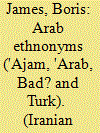

|
|
|
|
|
| Publication |
2014.
|
| Summary/Abstract |
In general terms, the history of the Kurds in the medieval period-or at least those described as being Kurdish in our sources-has attracted relatively little attention within western academia. Moreover, those scholars who have thought to comment on the subject have in general relied on the work of the eminent Russian orientalist Vladimir Minorsky. Hence there has been very little re-examination of the Arabic sources which Minorsky consulted. This article constitutes a first attempt to re-examine some of the "historical orthodoxy" regarding the meaning and nature of the term Kurd in the Middle Ages. More precisely, it aims at questionning the work of those scholars who argue that, due to its ambiguous usage, the term Kurd in the medieval period did not denote an ethnic people. This paper argues that in fact the very ambiguity surrounding the term is indicative of its ethnonymic value and through an examination of the meaning of the term Kurd in this era we can gain a greater understanding of conceptions of ethnic difference in Arabo-Muslim sources.
|
|
|
|
|
|
|
|
|
|
|
|
|
|
|
|
| 3 |
ID:
089056
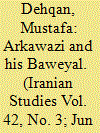

|
|
|
|
|
| Publication |
2009.
|
| Summary/Abstract |
The study of southern Kurdish literature is largely dominated by a bipolar perspective. Literature in southern Kurdistan is mostly, if not exclusively viewed in the context of relations between Iran on the one hand and, on the other, Iraq, the local states of the eighteenth and nineteenth centuries. To be sure, Iran acquired a dominant role in southern Kurdistan, yet it is also considered to have been the only dynamic factor in southern Kurdish dialect, while the Iraqi regions are supposed to have fulfilled an essentially passive one. This article presents the most well-known poem of Arkaw z?, a southern Kurdish poet from Pi tiku, an Iranian region of southern Kurdistan. It transcribes, translates, and glosses a Feyl elegiac text in which the poet describes the death of his son. Notwithstanding my dialectological purpose, the article may also provide some raw material for the historians.
|
|
|
|
|
|
|
|
|
|
|
|
|
|
|
|
| 4 |
ID:
174140
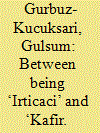

|
|
|
|
|
| Summary/Abstract |
This article engages with Kurdish ulamas’ and shaykhs’ relatively unknown narratives on manipulative shaykhs as a legitimate part of the story of Kurdish national history. The criticism against yalancı, fake, shaykhs from within the religious class is not encountered very often in Kurdish nationalist history writing. The stereotypical and generalizing approach to shaykhs in nationalist historiography hindered the diverse nature of religious class and silenced reformist discourses against the manipulation of religion. This article brings in the examples of ‘a-typical’ Kurdish ulama and shaykhs with national dreams, who delegitimized deceptive shaykhs by uncovering their deceits. As their narratives unfold, the diverse nature of the Kurdish religious class appears and the story of Kurdish nationalism becomes more complete. My findings also challenge the nationalist dichotomy that national and religious identities are exclusive of one another.
|
|
|
|
|
|
|
|
|
|
|
|
|
|
|
|
| 5 |
ID:
095389
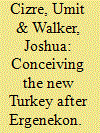

|
|
|
|
|
| Publication |
2010.
|
| Summary/Abstract |
In Turkey, a politically autonomous and secular military is pitted against a popularly elected, Islamic-rooted government, which has acquired new energy for domestic and foreign policy agendas and political reform. The election of Barack Obama and the Democrats in the US, as well as reverberations from the ongoing Ergenekon revelations and attempts to address the Kurdish question have brought new influences and players into the game of domestic Turkish politics. This article analyses the possible impact of these changes domestically, as well as from the EU and US perspectives.
|
|
|
|
|
|
|
|
|
|
|
|
|
|
|
|
| 6 |
ID:
096970
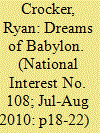

|
|
|
| 7 |
ID:
133820
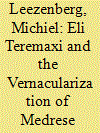

|
|
|
|
|
| Publication |
2014.
|
| Summary/Abstract |
Eli Teremaxi's Serfa Kurmancî has not yet received the critical attention it deserves. It was dismissed by Auguste Jaba as a text of "minor interest," but in fact it is of paramount importance both for the study of the Kurdish language and for the history of Kurdish learning. Not only does it contain the oldest extant detailed remarks on Kurdish grammar, in all likelihood preceding even Garzoni's 1787 Grammatica; it is also among the first examples of Kurdish-language prose writing. The rise of prose texts of learning in Kurdish in the eighteenth century is an aspect of so-called "vernacularization," i.e. the use of a vernacular language for new purposes of written literature and learning. Vernacularization is, this article argues, a crucial prerequisite for the rise of a national language. The article also briefly discusses traces of a similar development in some of Teremaxî's near-contemporaries.
|
|
|
|
|
|
|
|
|
|
|
|
|
|
|
|
| 8 |
ID:
174901
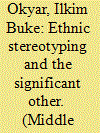

|
|
|
|
|
| Summary/Abstract |
This article examines about a hundred cartoons published during the decade long Kurdish insurgency in the eve of the establishment of the Republic of Turkey from 1925-1938. It attempts to assess how the relational construction between colloquial culture, the cultural construction of national characters and the state discourse are intertwined in defining the self and the other in the development of Turkish national identity. The article seeks to highlight the importance of previously neglected late Ottoman and early Republican colloquial Turkish political cartoons. This approach is crucial to any attempt at capturing the voice of nationalist discourse in the early Republican period, where the perceived image of the Kurd as the significant internal other is tainted forever by its supremacist origins.
|
|
|
|
|
|
|
|
|
|
|
|
|
|
|
|
| 9 |
ID:
099828
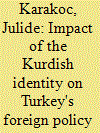

|
|
|
| 10 |
ID:
096455
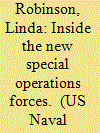

|
|
|
| 11 |
ID:
174158
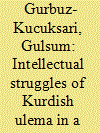

|
|
|
|
|
| Summary/Abstract |
Modern Kurdish thought encompasses many factions with diverse social, political, religious and ideological positions in and outside of Turkey.1 While our knowledge about the evolutions of the nationalist thought among Kurdish secular intellectuals has radically increased, the intellectual heritage of Kurdish religious intellectuals, the ulema, who have been searching for the best ways of delivering their societies from internal and external exploitations, have been mostly overlooked in Western academia. This article aims to bring to light the intellectual wrestling of a Kurdish mullah, Ali Zile of Diyarbakır, with the problems he believed Kurds faced from many angles: sheikhs, the passive madrasa tradition, the Kurdish secular/Marxist nationalism from the inside, and the Turkish nationalism and the Western imperialism from the outside.
|
|
|
|
|
|
|
|
|
|
|
|
|
|
|
|
| 12 |
ID:
102405
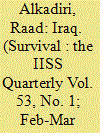

|
|
|
|
|
| Publication |
2011.
|
| Summary/Abstract |
The world breathed a sigh of relief at the announcement of a new Iraqi government on 21 December 2010. After nine months of wrangling following the 7 March elections, Prime Minister Nuri al-Maliki finally engineered a deal that kept him in place at the head of a 42-person cabinet. Maliki was unable to name a full coterie of ministers; ten of the portfolios, including the main security ministries, are being managed on a temporary basis by other ministers until permanent nominations are made. Nevertheless, approval of the cabinet brought to an end a crisis that left the political system in limbo and saw a deterioration of the security situation.
|
|
|
|
|
|
|
|
|
|
|
|
|
|
|
|
| 13 |
ID:
118263
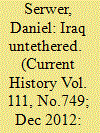

|
|
|
|
|
| Publication |
2012.
|
| Summary/Abstract |
Iraq is still in search of internal equilibrium and its proper international role after the trauma of more than thirty years of Saddam Hussein's dictatorship and eight years of American military occupation…
|
|
|
|
|
|
|
|
|
|
|
|
|
|
|
|
| 14 |
ID:
163311
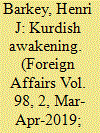

|
|
|
|
|
| Summary/Abstract |
We’ve been fighting for a long time in Syria,” said U.S. President Donald Trump in the last days of 2018. “Now it’s time for our troops to come back home.” The president’s surprise call for a rapid withdrawal of the nearly 2,000 U.S. troops stationed in Syria drew widespread criticism from members of the U.S. foreign policy establishment. But it came as an even greater shock to the United States’ main partner in the fight against the Islamic State (or ISIS), the Syrian Kurds. For weeks prior to the announcement, Turkish President Recep Tayyip Erdogan had been threatening to invade areas of northern Syria controlled by Kurdish militants. The only thing stopping him was the presence of U.S. troops. Removing them would leave the Kurds deeply exposed. “If [the Americans] will leave,” warned one Syrian Kurd, “we will curse them as traitors.”
|
|
|
|
|
|
|
|
|
|
|
|
|
|
|
|
| 15 |
ID:
074758
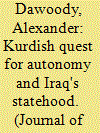

|
|
|
|
|
| Publication |
2006.
|
| Summary/Abstract |
This study examines the Kurdish historic aspiration for self-rule and the opportunities presented by the collapse of the Iraqi regime of Saddam Hussein in 2003. In addressing these issues, the primary objectives are to identify the challenges facing the Iraqi Kurds' quest for self-rule, the problems created by the Kurdish quest for ethnicity-based federalism, and the ramifications of the impending Iraqi federalism for the future of Iraq as a country.
|
|
|
|
|
|
|
|
|
|
|
|
|
|
|
|
| 16 |
ID:
133823
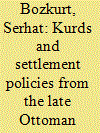

|
|
|
|
|
| Publication |
2014.
|
| Summary/Abstract |
This article highlights the continuities and discontinuities between the settlement policies of the late Ottoman state and early Republican Turkey. It argues that although there was a certain degree of evolution in the language employed by the state between the late Ottoman and Republican periods, there is a significant amount of overlap between the policies pursued by the Committee of Union and Progress which seized power in 1913 and the Kemalist regime established in the early 1920s towards the Kurds. In short, the emergence of settlement policies aimed at assimilating the Kurds into the Turkish nation are not an innovation of the Kemalists; it is possible to trace them to the late Ottoman period. This is substantiated through a comparison of two laws relating to settlement; the 1916 "Ordinance Outlining the Transfer and Settlement as well as the Sustenance and Maintenance for Refugees arriving from Conflict Zones" prepared by the Ottoman Ministry of the Interior's General Directorate for Tribes and Refugees and the Settlement Law of 1934, which was implemented in Republican Turkey and which remained on the statute books until 2006.
|
|
|
|
|
|
|
|
|
|
|
|
|
|
|
|
| 17 |
ID:
073034
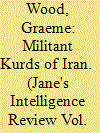

|
|
|
| 18 |
ID:
098436
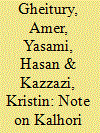

|
|
|
|
|
| Publication |
2010.
|
| Summary/Abstract |
Despite the great number of studies conducted by Western scholars exploring kinship terminologies in different languages, there seems to have been little attempt at dealing with kin words in Iranian languages like Kurdish. More specifically, Kalhori, as a southern dialect of Kurdish, has rarely been subject to studies of this nature. Underlining the significance of such studies in the wider linguistic and anthropological contexts, this study attempts to explore kin words Kalhori speakers use to refer to or address their relatives. We also make an attempt to investigate the possibility of presenting a formal explanation of the terms by placing them in a componential analysis framework.
|
|
|
|
|
|
|
|
|
|
|
|
|
|
|
|
| 19 |
ID:
094615
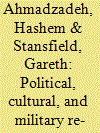

|
|
|
|
|
| Publication |
2010.
|
| Summary/Abstract |
This article aims to shed light on the modern history of the Kurds in Iran, with particular reference made to the main Kurdish political and social movements of the 20th century following World War I and the establishment of an Iranian nation-state. The modernization and centralization of the new state deprived the non-Persian ethnic groups, including the Kurds, of democratically expressing their national aspirations. The consequences of this policy and the struggle of the Kurds against it throughout the remainder of the century and up to the present are the main issues discussed in this article.
|
|
|
|
|
|
|
|
|
|
|
|
|
|
|
|
| 20 |
ID:
157441
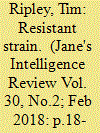

|
|
|
|
|
|
|
|